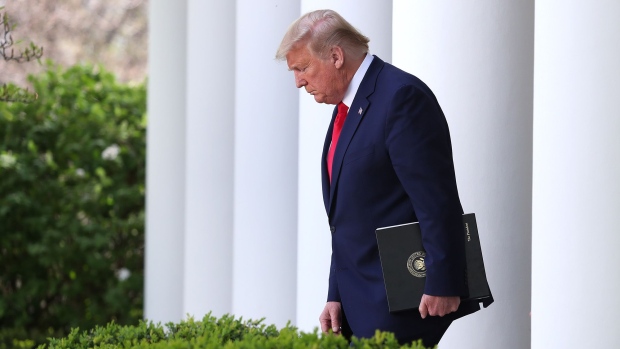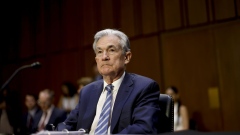Apr 2, 2020
Trump's 10 million barrel tweet is performance art
, Bloomberg News

Look, we all know basing anything on a tweet from President Donald Trump is a fraught exercise. But oil prices jumped as much as 24 per cent on the back of this on Thursday, so needs must:
Get the obvious out of the way. “I expect & hope,” “maybe,” and “if it happens” are not caveats to be ignored, especially coming from the president who oh-so-recently said coronavirus would disappear “like a miracle.” Initial reports from Saudi Arabia and Russia certainly came across a little more tempered about what had (or hadn’t) been agreed. We can assume that the tweet’s “10 Million Barrels” (and subsequent “15 Million”) figure is probably supposed to be 10-15 million barrels a day, although one can’t entirely rule out the possibility of MBS (Crown Prince) simply throwing out a large-sounding number and then saying “sorry DJT (President), you’re breaking up; try lat-”.
So, as often these days, it’s necessary to hold at least two realities in one’s head at once. One is that Trump misheard, jumped the gun, was misled, or — and I hope you’re sitting down for this — wasn’t being wholly truthful. In that case, let’s hope you timed your trade well on Thursday.
If, on the other hand, we assume Trump did manage to secure an agreement of a big supply cut from Saudi Arabia and Russia, then the obvious question is: What could he offer in return?
For Russia, the obvious candidate would be relief from sanctions, both existing ones related to the annexation of Crimea in 2014 and potential further sanctions lurking in Congress. This seems highly unlikely, though. Venezuela remains a point of friction between the White House and the Kremlin. Meanwhile, Trump will be relying on Congress to pass stimulus measures this side of November, and efforts by the White House to ease up on Russia could provide the impetus for Congress actually tightening sanctions on Moscow.
For Saudi Arabia, Trump could offer reassurance on general U.S. support, which has looked more and more ambivalent for at least a decade, especially given the tepid U.S. response to September’s attack on Abqaiq. He might also offer to play good cop versus the growing crowd of “bad cops” in Congress calling for punitive tariffs or legislation against Saudi Arabia. Like sanctions with Russia, though, these don’t seem to rise to the level of getting Saudi Arabia to reverse course and chop millions of barrels a day from its oil production.
Possibly, the reality — there’s that word again — is more prosaic and lies somewhere in between.
There’s an implacable mathematical problem confronting all oil producers: The world will soon run out of places to store excess barrels. Trading house Trafigura now estimates 35 million barrels a day — or one-third — of global oil demand has disappeared amid Covid-19 related distancing. When storage maxes out, oil prices will crash further. That will wreak havoc on frackers, but will also accelerate the burn rate on Russia’s and Saudi Arabia’s financial reserves. When refiners stop taking all that crude oil, production will be cut anyway.
Far better for Moscow and Riyadh to do that in the context of a grand bargain, especially if, as some in the oil industry are calling for, the U.S. agrees to contribute some cuts of its own. To be clear, U.S. oil production will start dropping after the summer anyway. But if oil is to avoid hitting the storage wall, then deep cuts would have to begin almost immediately; as Kevin Book of ClearView Energy Partners put it to me on Thursday: “Tweets travel at the speed of light; barrels move at 10 knots.” Trump, never a market purist, would no doubt love to play the dealmaker and earn brownie points with oil producing states (and donors) while he’s at it. Beware, though: Numbers viewed in a tweet can appear larger than they actually are.
Similarly, Putin and Prince Mohammed bin Salman derive a great deal of prestige from acting as power-brokers. Strutting the global stage offers one way of masking the fundamental weaknesses of their respective petro-states. The timing also shouldn’t be lost on anyone: With Saudi Arabia due to set official selling prices for May sales any day now, a bump to oil benchmarks on the back of a presidential tweet and talk about talks offer a reasonable return on a small investment.
For those very same reasons, the U.S. shouldn’t be jumping into such a deal at all (see this). Yet with a further oil crash looming, and political goodies to be derived from being seen to take control, there’s a performative aspect to all this that holds great allure for three practiced performers.
This column does not necessarily reflect the opinion of Bloomberg LP and its owners.
Liam Denning is a Bloomberg Opinion columnist covering energy, mining and commodities. He previously was editor of the Wall Street Journal's Heard on the Street column and wrote for the Financial Times' Lex column. He was also an investment banker.




